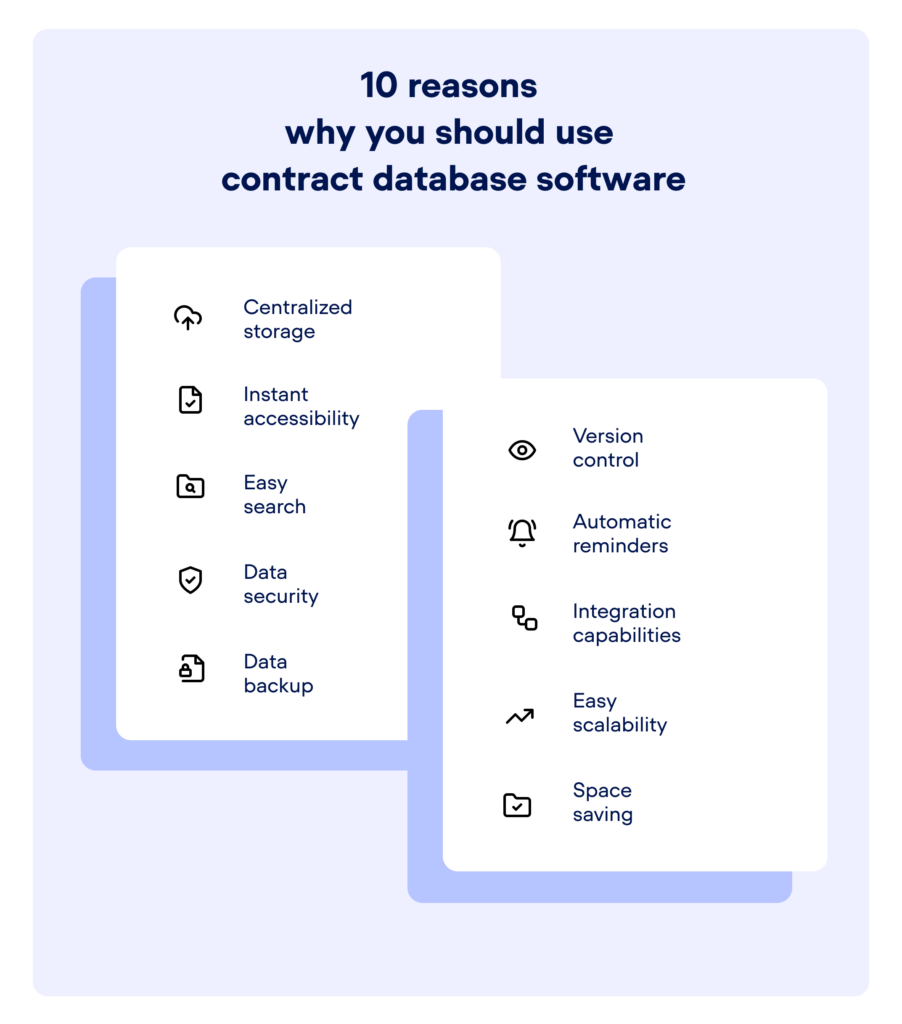Contract Database – Why and How to Go Digital
Contracts form the backbone of many business operations, and how they are stored and accessed can impact efficiency and decision-making.
Traditional paper repositories, while familiar, are increasingly outmatched by the capabilities of digital contract database software. These databases not only centralize contracts but also introduce a level of accessibility and organization that paper systems simply cannot achieve.
What is a contract database?
A contract database is a centralized repository for storing and organizing contractual documents. It provides a single source of truth for all contractual information and allows users to quickly retrieve specific contracts. It also enables easy tracking of contract statuses, key dates, and obligations, ensuring compliance and proactive contract management.
What is contract database software?
Contract database software is a digital tool designed to store, manage, and track contractual documents. These systems often come with features like automated reminders for key dates and advanced search capabilities. They streamline the contract management process, ensuring businesses remain organized and their contracts are compliant.
10 reasons why you should use contract database software
Contract database software has revolutionized the way organizations manage their contractual documents, moving away from traditional paper-based methods.
Here is a list of 10 compelling reasons to make the switch to contract database software:
- Centralized storage
- Instant accessibility
- Easy search
- Data security
- Data backup
- Version control
- Automatic reminders
- Integration capabilities
- Easy scalability
- . Space saving

1. Centralized storage
With contract database software, all contracts are stored in one digital repository, making organization and management easier. This ensures that all team members access the same set of documents, minimizing the risk of referencing outdated or incorrect data. Additionally, it eliminates the confusion that can arise from having multiple copies of contracts scattered across different locations.
2. Instant accessibility
A digital contract database allows you to quickly retrieve and view contracts from anywhere at any time, reducing time spent searching through physical files. You no longer need to sift through filing cabinets or request documents from offsite storage. With contract database software, any authorized user can access the required document within seconds, ensuring timely decision-making.
3. Easy search
A digital repository allows users to easily and quickly find specific contracts, clauses, or terms within the database. Instead of manually flipping through pages, users can type keywords or use filters. Some contract database tools also include OCR which helps you search for text in scanned documents and images. All this significantly reduces time spent looking for specific information and improves operational efficiency.
4. Data security
Most contract database tools employ stringent security measures, including encryption and access controls, to safeguard sensitive contract information. This prevents unauthorized access and protects against potential data breaches, ensuring the security of critical data.
5. Data backup
Digital databases can be backed up to ensure no data is lost. This protects against data loss caused by hardware failure or accidental deletion. Many software providers offer automatic backup of contract data to streamline the process and ensure that an up-to-date copy is always available. Offsite or cloud contract backups also safeguard data from physical damages like fires or floods.
6. Version control
With contract database software, you can track changes made to contracts over time, ensuring you always have the most recent version. This ensures that users always work on the most current version of a document, preventing confusion. It also offers a historical record of changes, which can be crucial for resolving disputes or understanding past decisions.
7. Automatic reminders
A contract database tool often comes equipped with automatic reminders, a feature that is critical for managing deadlines and ensuring timely renewal of contracts. This functionality aids in avoiding missed obligations or lapses in contracts, which could lead to significant financial or legal consequences. The automatic notification system in contract database software acts as a failsafe, ensuring you stay on top of your contractual obligations and agreements.
8. Integration capabilities
Contract database software can integrate with other business systems, such as CRM or ERP, creating a seamless flow of information. This boosts efficiency and ensures consistency across different platforms.
9. Easy scalability
Digital tools significantly aid with scalability, making it easier for organizations to grow and manage increasing volumes of contracts. Many contract database software options are modular and can be upgraded to include additional features and more storage space as your needs evolve.
10. Space saving
By digitizing contracts, database software eliminates the need for physical storage, saving valuable office space and reducing storage costs. Plus, it’s environmentally friendly, reducing paper usage.
Considerations before implementing a digital contract database
If you’re thinking of implementing a digital contract database, you should decide whether you need contract database software or contract management software.
They are closely related, but they have different scopes. Both contract database software and CLM software have contract database functionalities, but the latter offers a broader range of tools and functionalities to support the entire contract lifecycle.
Contract database software vs contract management software
Contract Database Software
Primary Function: Its main purpose is to store and organize contractual documents in a centralized digital repository.
Features: It primarily focuses on the storage, retrieval, and basic tracking of contracts.
Scope: This software is more limited in its functionalities, mainly concerning the storage and accessibility of contracts.
Contract Management Software:
Primary Function: This software helps manage the entire lifecycle of a contract, from creation and negotiation to execution and post-contract analysis.
Features: Beyond just storage, it offers tools for drafting, collaboration, approval, performance monitoring, tracking, and more.
Scope: CLM software is a comprehensive solution, helping to manage every aspect of the contract process. It allows businesses to not only store but also efficiently manage and analyze their contracts.
In short, while both types of software deal with contracts, contract management software provides more features to effectively support the entire lifecycle of contracts.
Step-by-step digital contract database implementation
Going from a paper contract repository to a digital database is not a simple task. However, with careful planning and following the steps below you can set yourself up for success and reap the benefits of a digital contract database.
Step 1: Conduct an Audit of Current Contracts
Start by cataloging all the paper contracts you currently have in your repository.
This inventory process helps identify which contracts are active, nearing expiration, or are outdated. By grouping them according to priority or department, you can strategize an orderly transition. It’s also an opportunity to discard redundant or obsolete contracts, ensuring only relevant documents are moved to the digital platform.
Step 2: Choose a Contract Database Solution
With an understanding of your contract volume and needs, research and select a tool that aligns with your requirements.
Consider software that offers easy data import capabilities, robust security features, and intuitive user interfaces. Ensure that the software you choose has scalability features so it can grow with your organization’s needs. Remember to think about the scope of the software – do you need strictly a database, or a tool to help manage the whole contract lifecycle?
Step 3: Digitize and Standardize Contract Formats
Convert your paper contracts into digital formats, typically through scanning.
As you digitize, ensure documents are saved in a standardized format, like PDF, for consistency. Apply a uniform naming convention for files, perhaps based on contract type, date, or department, to make future retrieval easier.
Step 4: Implement Data Entry with Quality Checks
Migrate the digitized contracts into your chosen digital contract database.
As contracts are uploaded, metadata like contract parties, dates, and key terms should be inputted to facilitate advanced search capabilities later. Make sure to also organize your contracts into folders and subfolders for easier management.
Given the importance of accuracy, it’s essential to have a two-step process: one person enters the data, and another reviews it for quality assurance.
Step 5: Educate and Train the Team
Transitioning to a digital system requires users to adapt to a new way of accessing and managing contracts.
Host training sessions to acquaint your team with the new digital database’s functionalities and best practices. Create user manuals or cheat sheets for quick reference. Emphasize the advantages of the digital system, like speedy retrieval or automated reminders, to encourage team members to fully utilize and embrace the new system.
Following these practices will ensure a smooth transition from a paper-based repository to a digital contract database, positioning your organization for efficient contract management in the digital age.
In a world where quick access to information is paramount, digital contract databases have emerged as an indispensable tool for businesses. They not only offer superior organization and accessibility over traditional paper repositories but also pave the way for enhanced decision-making and streamlined operations.
As contracts continue to be at the heart of business collaborations, ensuring their efficient management with digital databases becomes an investment in future success.



